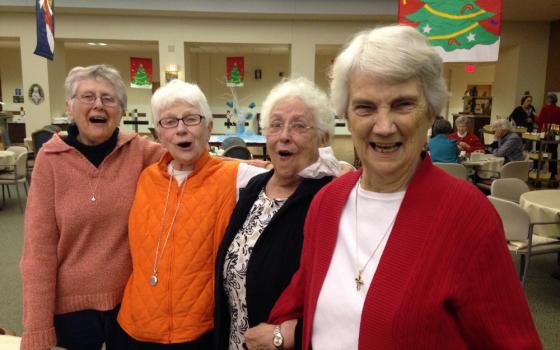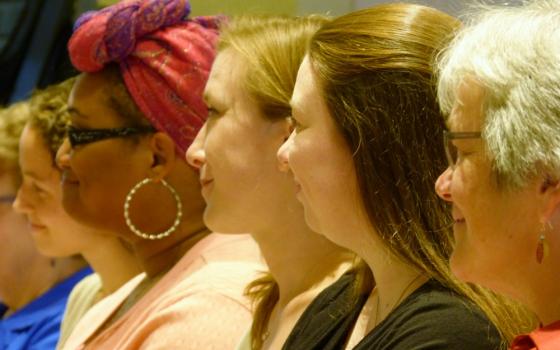I have laughed more in the past two years than almost any other time in my life. Coincidentally, it has also been two years since I entered my religious community.
When I first began spending time with sisters, one thing surprised me: how much they laughed. Sure, they possessed a number of other attractive qualities, like prayerfulness, courage, hospitality, humility, compassion and a commitment to justice. I had sort of expected these qualities.
What captivated me most, though, was their ability to be playful, silly and fun. They laughed and hugged freely. These qualities, I have come to realize, are manifestations of souls so steeped in God’s love that they can’t help but overflow in an authentic expression of joy.
In the Dominican tradition we speak of being the Holy Preaching, which is a fancy way of saying we aspire to embody the Gospel not just in our words but with our very lives. As I reflect on my early encounters with my sisters, I realize that the joy they embodied and which I so desired was, in fact, the Holy Preaching. They had so internalized Jesus’s message that they simply couldn’t hold it in.
A promise to play
My sisters’ joy influenced me so much that this past year, my goals for the canonical novitiate included laughing frequently and cultivating actively a healthy sense of humor. The canonical novitiate (a year dedicated primarily to prayer, study and discernment) can be a very rich year, but also a challenging one. Knowing that I could get bogged down with the intensity of the year, I made a conscious decision to prioritize levity.
I also realized while I have a natural playful streak, I had somehow internalized the message that this part of me was superfluous. Maybe this comes from societal pressures to be productive, or maybe, as James Martin posits in his excellent book Between Heaven and Mirth, it’s from a church that has historically undervalued humor. Either way, I’ve learned that nothing could be further from the truth. Humor and play are important components of a healthy spiritual life, and my sisters are master teachers of this.
Even Thomas Aquinas, the revered Dominican intellectual who isn’t necessarily known for his levity, writes that “play is necessary for the intercourse of human life.” Good Dominican that I am, I’ve adopted his words as a spiritual imperative and practice them every chance I get.
Joyful scripture
Perhaps it’s not proper exegesis, but when Jesus tells us to “become like little children,” I can’t help but think he was encouraging to be a little more playful and outwardly joyful! Kids do this naturally. We love videos of babies laughing and young children being silly, perhaps because they illustrate a certain exuberance and free expression of joy that we sometimes forget or self-censor as adults. And really, is there anything better than baby laughter?
One of my favorite poems by Ranier Maria Rilke demonstrates this desire for a free-flowing exchange of joy:
May what I do flow from me like a river,
No forcing and no holding back,
The way it is with children.
There are plenty of other Biblical examples of joy. I’m especially drawn to passages of God and creation delighting in one another (like Psalm 139, Psalm 65, and the creation narratives), because the God who delights in us also gave us the capacity for delight and joy. Plus, I’m discovering more and more instances of humor in Scripture. If you don’t believe me, I dare you to check out this rendition of Jonah and the whale and try not to laugh.
Lightening the load
Of course, there are times when laughter, humor and levity simply aren’t appropriate. Sometimes, though, levity doesn’t mean making light of a difficult situation so much as lightening the load, which is both sensible and spiritual.
On a recent visit to the Maryknoll Sisters’ motherhouse I was drawn to photos of their foundress, Mother Mary Joseph Rogers, because of the smile she displayed in each one. I soon learned that when describing qualities a sister should embody, Mother Mary Joseph emphasized “the saving grace of a kindly humor.”
She knew that cultivating a good sense of humor doesn’t deny the suffering and hardships of life, but it can help us through them. Sometimes humor literally is a saving grace. It can draw us together, help put things in perspective, or at the very least, provide some reprieve in times of sorrow.
______
Although I have learned much about joy, levity and humor from my sisters, I would never claim that these are the exclusive purview of religious life. It seems to me that authenticity, freedom, and joy are closely related. People who are authentic tend to be free and joyful, and vice versa. I’m grateful that for me, religious life seems to nurture each of those things.
The joy that captured me when I first met our sisters is working its way into my heart, and I believe it’s not just by association but because this is the path to which God has called me.
[Christin Tomy is a novice with the Dominican Sisters of Sinsinawa, Wisconsin. She has lived and worked in Central and South America and has a background in Spanish and social work. She is passionate about social justice, good hugs, Iowa and most outdoor activities. She also writes for her community’s blog at catherinescafe.blogspot.com.]



